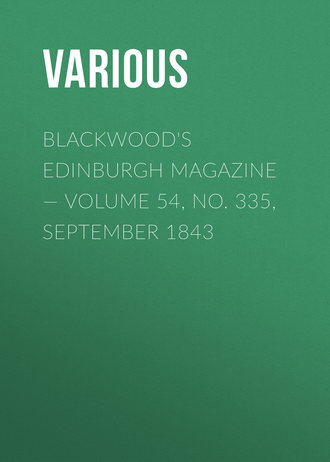
Various
Blackwood's Edinburgh Magazine — Volume 54, No. 335, September 1843
Sir Robert Peel is not more correct in his so bitterly reproached "do-nothing" policy about Irish repeal, than in his "do-nothing" emphatic policy about Corn-law repeal. No man better knows how, left to themselves, the Brights and Cobdens will turn out to be Marplots. The dolts cannot see, that however hard the Villierses, and such as them, bid for popularity against them, in apparently the same cause—they have an interest diametrically adverse in the general sense, and on the fitting opportunity will throw them overboard. The most influential part of the liberal press, both metropolitan and provincial, it is well understood, concur with the League to some extent in its avowed objects, without at all liking its leaders, or the means pursued for the end sought, and wait only for the occasion, which will come, for damaging and finally overthrowing them in popular estimation. In Manchester, Leeds, and Birmingham, that is, in the privately known sentiments of the leading press and other liberal leaders of opinion in each, it is notorious that this feeling and occult determination prevails. Mr Cobden himself, and some of his colleagues, are not unaware of the fact, and have, in the factious and political sense, latterly trimmed their course accordingly. But, notwithstanding, confidence they have recovered not—never will, because apostacy or trimming cannot inspire confidence; they are endured—to be used, and to be laid aside, "steeped in Lethe" and forgotten, as in time they will be.
In this brief article we have treated only of the salient points of the colonial slanders of Mr Cobden and the League. We have challenged them only with carrying to colonial account above one million and a half sterling, with which the colonies, so understood in the true sense, have nothing to do; and we have shown that one million and a quarter nearly of the charge made against colonial trade, legitimately appertains to foreign trade. Hereafter we purpose to investigate the respective charges entailed upon the country by foreign and colonial trade, to apportion to each its share, and to strike the balance of profit and loss relatively upon each. Let it suffice for the present that we have shown Mr Cobden and his figures to be utterly undeserving of credit in a partial point of view only; we could, as we shall, prove them to be, either through idiotical ignorance or stupidly malicious intent, more worthless of credit still in the general and rational sense—in the relative proportions of the totality of national expenditure. The blunderer, ignorant or malignant, classed the expenditure for Guernsey and Jersey, and the Channel islands, under the head of colonial military expenditure, as well as a considerable portion of the cost of the Chinese war, partly repaid or in course of being repaid. He took the exports to the colonies for 1840, when the Chinese war was only in its origin, and expense scarcely incurred; and he adopted the estimates for 1843, when the expenses of the Chinese war had to be provided for, a portion of which was charged under colonial heads. He omitted, as we have said, any account of permanent charge for conducting and protecting the trade with China, amounting to a considerable sum yearly under the old system, and which hereafter will be more—all to the account of "foreign trade." He omitted besides, at the least, half a million for the war with China—all for "foreign trade." We shall have other occasions, however, for exposing his dishonesty, and vindicating the colonies from his calumnies. The only words of something like truth he spoke, were against that bastard and discreditable system, purporting to be a "self-supporting system," concocted by adventurers and land-jobbers for achieving fortunes at the cost, and to the ruin, of the unsuspecting emigrating public, and to the signal detriment and dishonour of the state.


